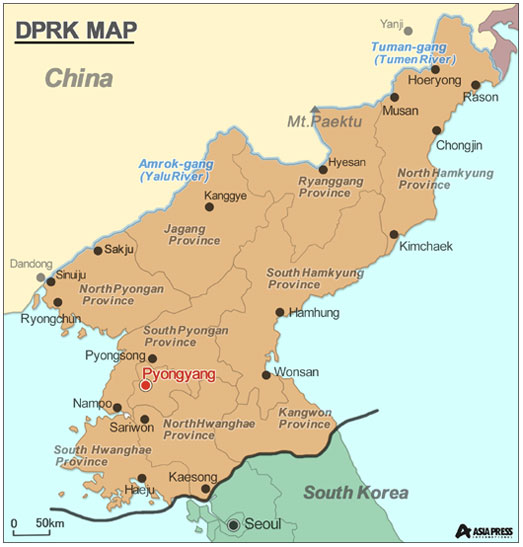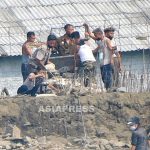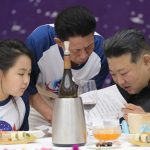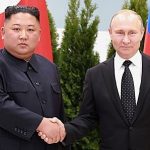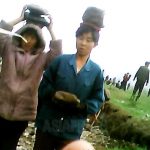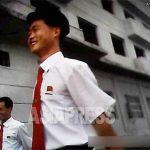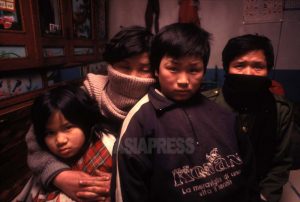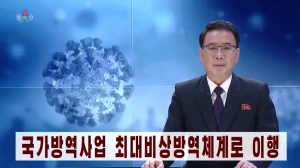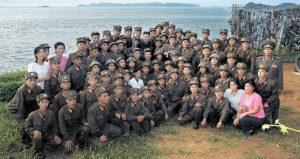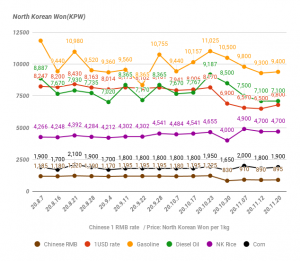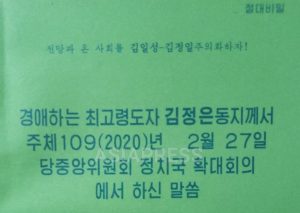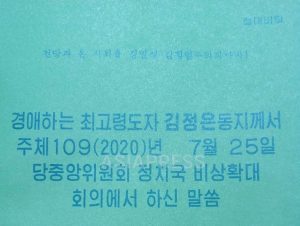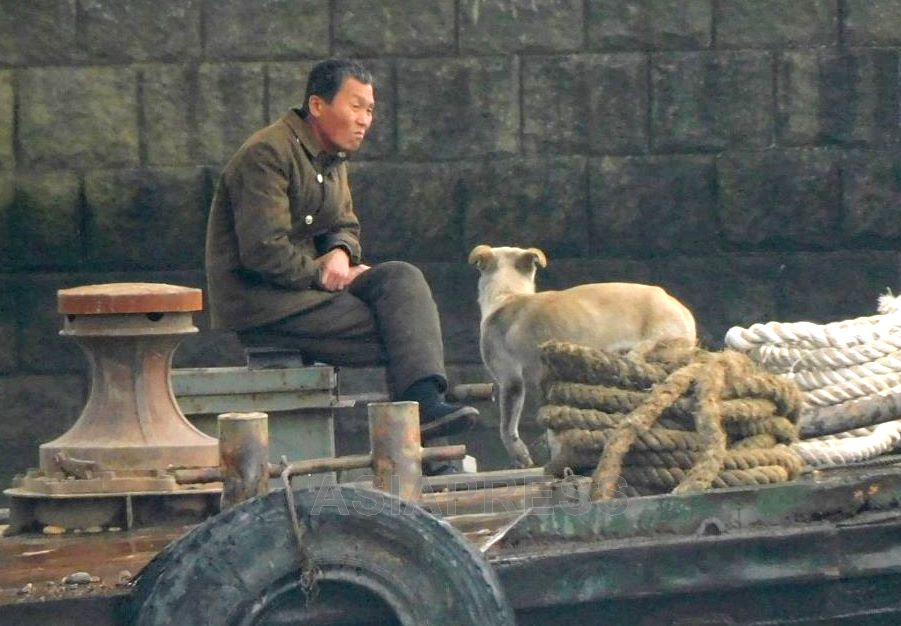
A North Korean worker on a barge on the Yalu River. He has a dog with him. Photo taken by ASIAPRESS from the Chinese side of the Yalu River across from Sinuiju, North Pyongan Province in October 2023.
Wage increases implemented across all workplaces in northern cities from November to December 2023, North Korean authorities significantly raised the wages of workers and government officials at state-owned enterprises (SOEs). The increase is about 10 times higher than at the beginning of 2023. ASIAPRESS reporting partners in various regions confirmed the wage increase. In some cases, the workers are being paid through electronic cards. What is the aim of the Kim Jong Un regime's drastic "wage hike"? Reporting on this development will be divided into two installments. (KANG Ji-won / ISHIMARU Jiro)
◆ Even officials couldn't afford two kilograms of rice
What ASIAPRESS has concluded is that the regime's sudden "wage hike" appears to be aimed at covering the costs of buying rice and corn from state-run food stores. This will be dealt with in more detail later. For now, it's worth explaining the recent noim (literally, “labor wage”; North Korea doesn't call it a monthly salary) system.
In March 2023, ASIAPRESS surveyed labor wages in North Hamgyong and Yanggang provinces. At the time, monthly wages in state-owned enterprises were generally between 1,500 and 2,500 won for ordinary workers, 4,000 won for low-level officials, and 6,000 to 8,000 won for managers and deputy managers. In addition, the salaries of senior officials of People's Committees, the equivalent of local governments, ranged from 5,000 to 8,000 won.
As of March 2023, 1,000 won was equal to about 0.12 US dollars, meaning that even the highest salary of 8,000 won was only worth about 0.96 US dollars. At the same time, food prices in markets were around 6,000 for white rice and 3,000 for corn (all per kilogram), which shows that the wages people received weren't enough to cover purchases of basic necessities. However, after the start of the COVID-19 pandemic, government employees did receive food rations.
Multiple ASIAPRESS reporting partners all agreed that there is no one who can rely solely on the wages they get because much of it is taken away under the pretext of supporting the military, flood recovery efforts, and other activities.
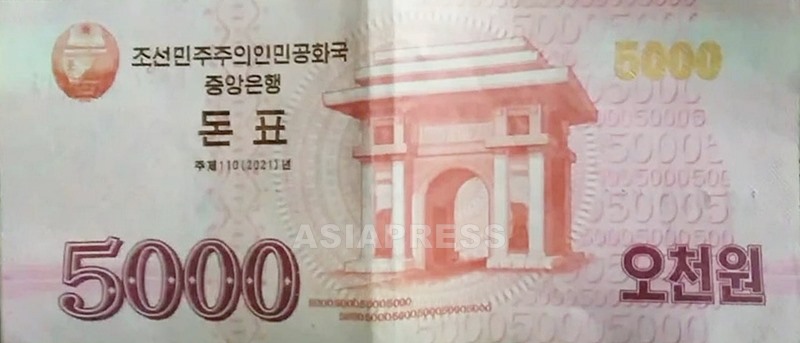
After being plunged into a financial crisis following a border closure to prevent the spread of COVID-19, North Korea issued temporary "cash vouchers," or donpyo, in August 2021.
◆ The wage system hasn't changed much in 13 years
Before 2020, only some government employees and businesses received food rations. Most people relied on other sources of cash income - such as private business activities, day labor, and bribes - to buy food and other essentials in the markets. For example, before the pandemic, a person could earn as much as 10,000 won a day at temporary jobs, such as working on public works projects (such as roads, pipelines, railways).
At the time of the March 2023 survey, labor wages had only doubled since Kim Jong-il's "currency reform" in late November 2009 (which devalued the currency by 1/100s of a percent). Since 2013, companies were allowed more discretion in how they paid their workers, and some of the most profitable ones paid 300,000 to 500,000 won per month, plus other food items such as white rice, cooking oil, alcohol, and meat.
Teachers are the exception to all this. In 2019, their salaries were raised to around 15,000 to 18,000 won, and they began to receive food rations. In response to widespread requests for money by teachers to parents, Kim Jong-un personally ordered improvements in how teachers were paid.
◆ Wages are still only 4.3 to 6.04 US dollars per month despite the wage hike
According to information collected from ASIAPRESS reporting partners, wages were raised once between April and September 2023. For typical state-owned enterprises, employees began to be paid 12,000-15,000 won per month. These wages more than doubled in November and December 2023.
Below is an overview of the monthly wages revealed by the December survey. Note the differences in pay by company and position. The surveyed companies include copper mines, iron mines, paper mills, and shoe factories.
Government employees: 35,000 to 50,000 won
Teachers: 38,000 to 50,000 won
State-owned enterprise workers: 35,000 won
Retiree pensions: 25,000 won
※At the time, 1,000 North Korean won was equal to about 0.167 US dollars.
ASIAPRESS was not able to conduct surveys outside of North Hamgyong and Yanggang provinces at the time. While there is no confirmation that the same "wage hike" occurred in Pyongyang and other cities, it is highly possible that there has been an increase in wages in other areas given that the wage hike is taking place under the state-managed economic system.
"Initially, the wage hike was supposed to start in November with state-owned enterprises, but many companies implemented it in December because they didn't have the cash," a Yanggang Province-based reporting partner told ASIAPRESS.
Additionally, some departments within SOEs that are able to independently generate funds have managed to raise their monthly income to 120,000 to 150,000 won, although this isn't common. Essentially, departments divvy out the profits from the sale of the company's consumer goods, which typically include beer, bread, and sweets. While the system is different from the normal wage system, the profit-sharing arrangement is popular in workplaces because the more profitable the company is, the bigger the share taken home by the employees.
Why did Kim Jong-un's regime raise labor wages more than tenfold all at once? As mentioned before, employee wages are linked to the costs of purchasing food at state-run food stores. But, what was the aim of the wage hike? As the survey progressed, ASIAPRESS found that the increase in wages is aimed at exerting control over employees. The next installment in this two-part series will explore this in more detail. ( to 2 >> )
※ ASIAPRESS communicates with its reporting partners through Chinese cell phones smuggled into North Korea.
<Inside N. Korea> Government implements wage by more than 10 times (1) Wages increase for employees of state-run enterprises and government agencies- <Interview> How was the public execution in Hyesan carried out?…In just four months, three executions have occurred in the city… “We were lined up at our places of work and marched to the execution site”
- <Investigation Inside N. Korea> How is the country’s fishing industry doing? (1) COVID and shrinking fishing grounds major problems…Kim regime’s restrictions on fishing lead some fishermen to financial collapse
- <Inside N. Korea>Bootleg liquor is an anti-state act The government launches harsh crackdowns, aims to monopolize distribution of alcohol and prevent shortages of grain
- <Inside N. Korea>Speaking to a Border Guard (1) Landmine Burial at the Korea-China Border? “Even soldiers are afraid because they don’t know where they’re buried”
- <Inside N. Korea> A recent report on conditions at farms (1) The harvest is better than last year, but lack of materials remains a serious problem (4 recent photos)
